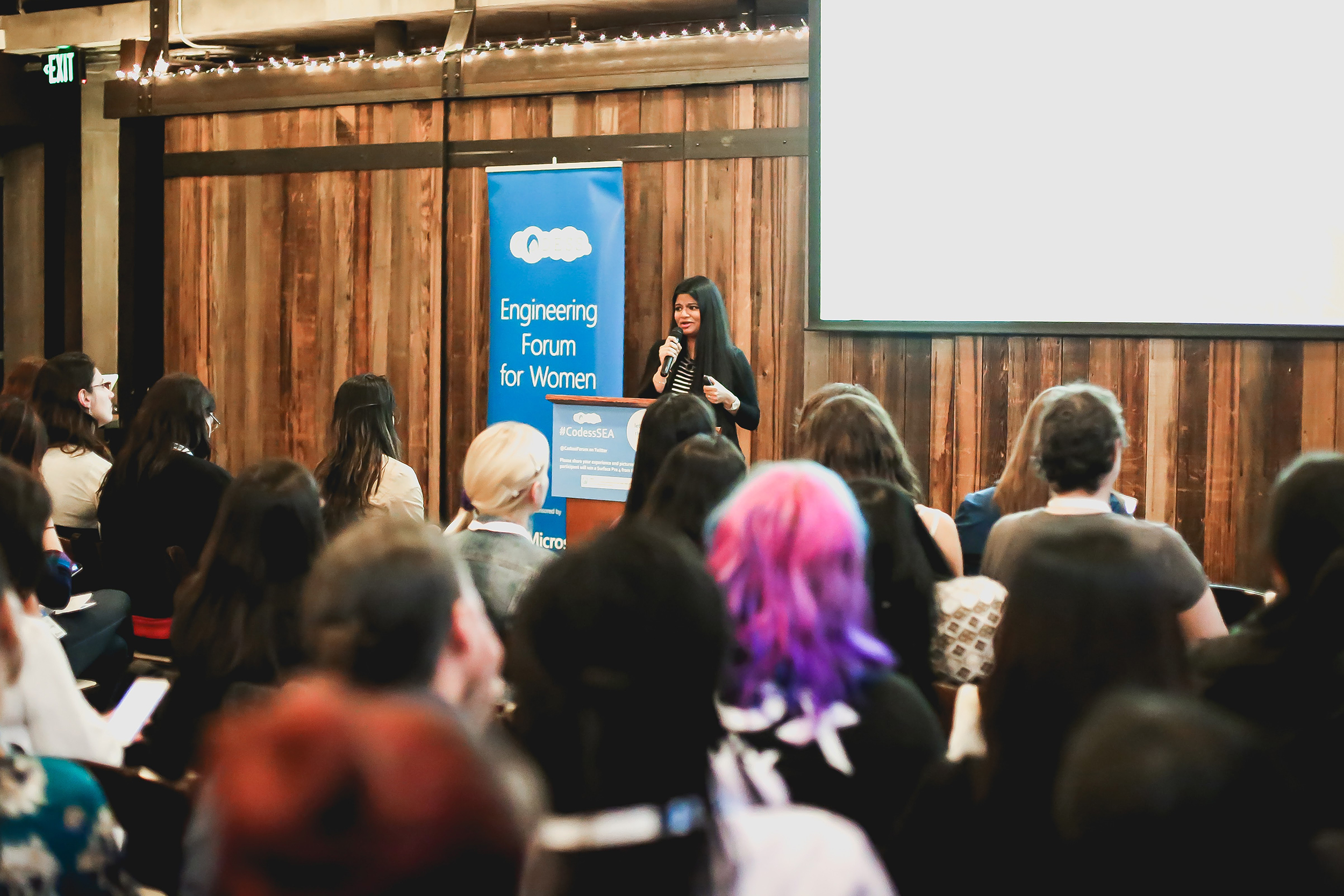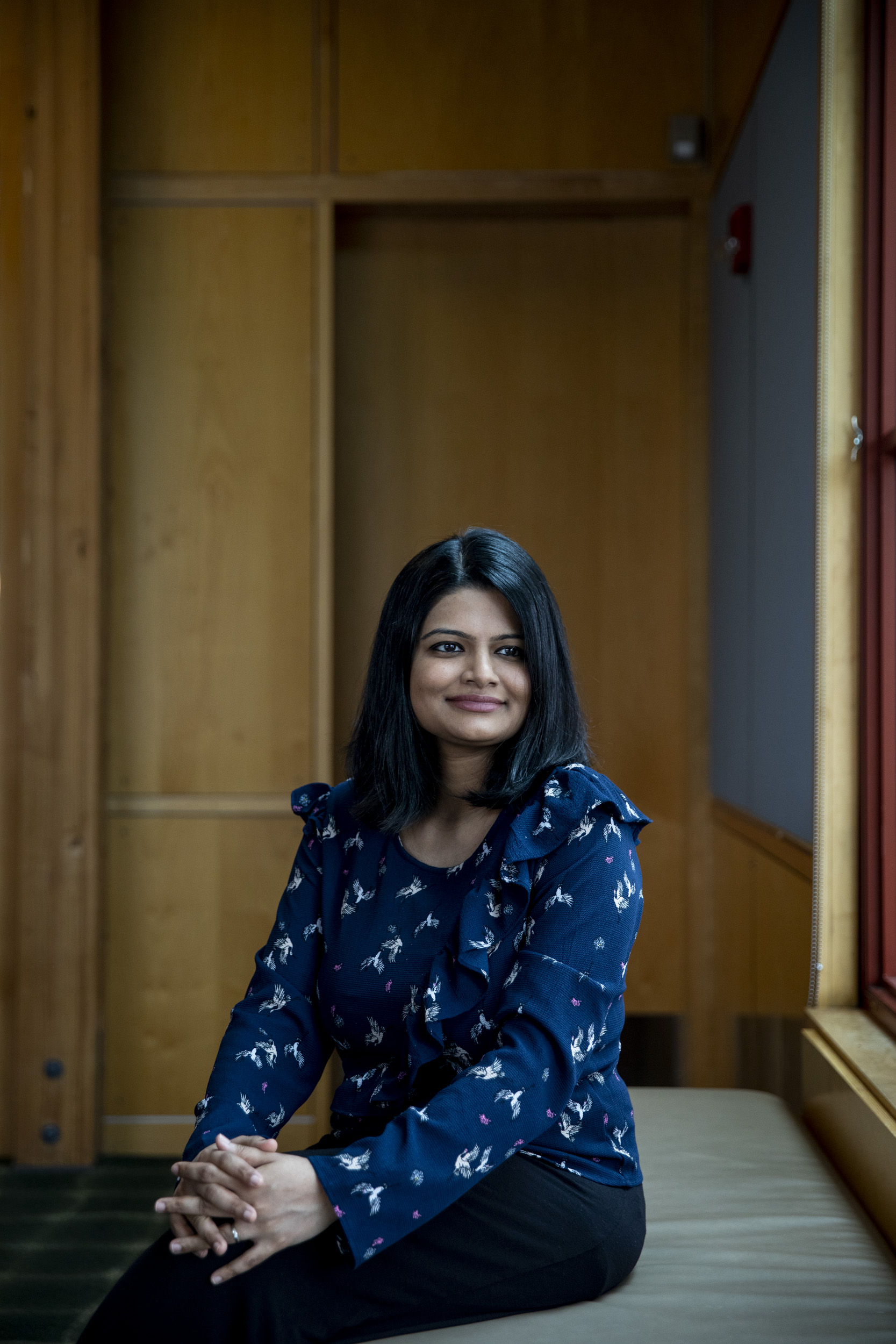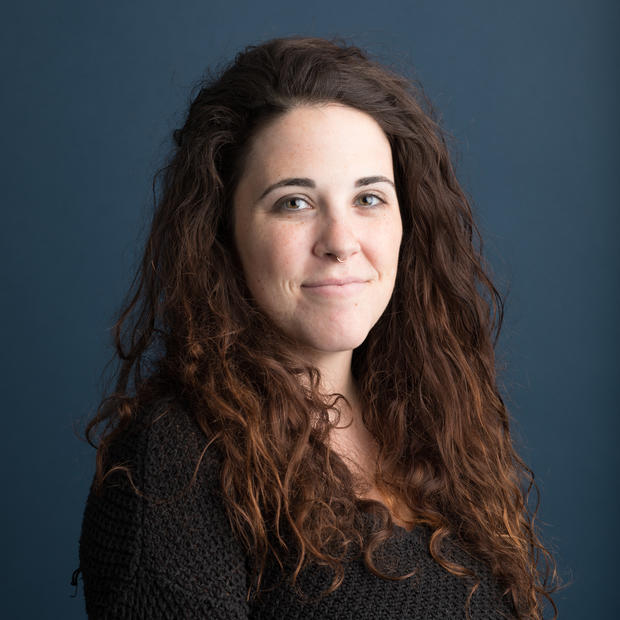This interview has been edited for clarity.
I was born and raised in Hyderabad in India as an only kid. I don't have any siblings, but I have a lot of cousins, most of whom are boys. Almost all of them did some form of engineering, and most of them came to the U.S. or other parts of the world, so they had an influence on me getting into engineering and STEM.
I had this view of, like, “Hey, they're boys and they play cricket.” I'm like "If you can play cricket, I want to play cricket." Right? Because I was the only girl, I didn't have anyone to compare to in my immediate household and compared myself with everybody else around me. That also led me to think, "OK, they're good at engineering. They're having pretty good careers, so of course I can do it, too."
I was really excited to go abroad and study, especially the field of human-computer interaction. I came [to the U.S.] in 2010 for my master's program, went to North Carolina State University.
I didn't quite realize that when you come to pursue your master's, all your classmates are not always your age. I came here and I found people with four years or more experience coming from amazing companies. They just knew what they wanted to do. And here I was clueless compared to them, right?
We have a really big career fair at NC State, and imposter syndrome creeped in. I'm like, "Why would I go and talk to these people? I have zero work experience and I'm two months into my master's." But I did have a few papers that I published when I was an undergrad, [so I thought], "I can speak, so I'm just going to go and speak to them. What's the worst thing that can happen?"
I had my eyes on these big four companies — Amazon, Microsoft, Google, Apple — because the scale in which they operate and the lives they touch just fascinated me. How many products touch millions and billions of people? It fascinated me that a group of people could work together and impact so many people. I wanted to get into one of these companies to understand and experience that firsthand. I went and spoke to these big companies and surprisingly the folks at Microsoft found my story interesting and, come November, I got an email for an interview.
That was surprising for me, too, because I obviously expected all these guys who had more experience to get it first and then maybe if there are spots open, me. That was my thinking back then. And now when I look back, I'm like, "That's so silly." And I tell the people I mentor, "That's not at all how it works." But back then that's how my head was. People undermine themselves a lot. But when you actually take the first step and start doing it step by step, it's not that big of a deal.
When I interned at Microsoft in 2011, I was the only girl in my team. I was very intimidated because nobody looked like me, nobody spoke like me. Everybody knew so much more than me. That was a very interesting experience for me, the whole internship and trying to find myself, trying to fit in. I think that was my first experience of being a woman in the corporate world.

Things have changed so much since then. Now my team has an amazing diversity ratio. But back then, I really was the only girl. And everybody else was Asian men, white men, European men [who] spoke very different, used acronyms I just couldn't understand. It was a very interesting experience of finding myself, yet at the same time surviving somehow so that I could get that full-time offer and come back.
I started getting involved with Grace Hopper the first year I started working at Microsoft [after graduation]. Grace Hopper is the largest conference of women in computing — by far the biggest in the world. This year we are expecting 25,000 women and men in tech. But the majority [are] women of all sorts. This year, I'm the general chair.
When I went there, I was blown away. One, because I saw 4,500 people like me in the same room. Two, because I spoke and had a group of people listen to what I have to say. I never thought that would be the case. I never thought I had enough to say or that people would actually listen to me. Because, again, imposter syndrome. And three, because of the things that I heard from other women who came and spoke there. I was like, "OK, I want to do more for this community."
Because of that conference, I heard firsthand about the several issues that moms face. How moms more or less have to get a motherhood penalty. How they are put on the back burner because they took a “vacation,” which is not a vacation. Anybody who says maternity leave is vacation is just ignorant, honestly speaking.
I had my first child [a few years ago]. When I started taking the maternity leave, I was very, very point blank [with my manager.] I would say that "Hey, I'm going to go now, but I'm going to come back. When I come back I want to work on something that is really compelling for me." I wanted to work on something that is honestly compelling enough for me to leave my daughter back home and go to work.
The first day back from maternity leave, I was filled with mixed emotions. I left my baby with my mom and dad — not even a nanny, my own parents! But, still, that first day was so hard. I walked into my office thinking that I still have four more weeks of mat leave left. If I'm not able to survive that first day, I'm going to take that and I'm going to think about work later on.
I started working on [virtual and augmented reality] 2½ years ago, [after that maternity leave]. The fact that I'm getting to lead something so cutting edge, so ambiguous. By the end of that first day I was like, "I'm going to figure this whole thing out: maternity, my baby, my work.” And now I understand how important that is. When a mom wants to take the next step and doesn't want to compromise in her career just because she's now a mom — having a supportive workplace, having a team that is trusting you makes a whole lot of difference.
My mom retired [recently]. My mother-in-law retired [recently as well]. They both had kids and did amazingly well in their careers. They're not in tech, but in their respective careers they did really well, and my mom always told me, "You don't have to compromise. If you want to do it, you can do it. It's only a difference of do you want to do it? Or do you have to do it?" If you have to do something, somebody's forcing or testing something on you, think twice about it. But if you really want to do it, it's in your hands.

I remember reading this one article about “freezing your egg and freeing your career.” It's been so many years, but the title just stuck with me. It’s always negative. Women mostly seem to be scared to tell their leadership or team that they're pregnant. They try to conceal for the most part until it becomes obvious. There are always articles about women who saved their careers by delaying their pregnancies.
People assume things like, "Oh, she's a mom — she doesn't want to travel. She's not interested in her next promotion. She's probably focusing more on her family for the next few years. Let's not trouble her by giving her this highly visible demanding project. We should probably not give her the next promotion. She might have to take off early, so let's not invite her to that VP meeting at 4 p.m." People assume a lot of things about moms.
Over the course of years, what I learned is to let the mom make her decisions. She will make the call if she wants to come to that 4 p.m. meeting or not. She will make the call if she wants to make that travel or not. She will make the call if she wants to go for that next promotion or not.
There's a lot of focus on getting more people into STEM, getting more people into technology, right? But if you look at the numbers right now, we are getting better at the top of the funnel. I'm a midcareer woman now at seven years into my career, and that's where it starts getting narrow. Data says that when women become moms, it gets narrower because of all these issues. It is hard to balance.
When I told [people] that I am the general chair of Grace Hopper while pregnant [with my second child], they'd be like "Why are you torturing yourself like that?" I'm like, "I'm not torturing myself. I love doing it. Chairing the largest tech conference with my son inside me is making the whole pregnancy experience doubly memorable for me."
I worked with a journalist at Forbes, and they put out an article [about motherhood and tech]. I felt that when I was looking for a source on the internet, all I could find was negative stuff. I didn't want that to happen for the next mom who was probably looking for the same push during her pregnancy.
Pretty much everybody in my organization now knows about [my] motherhood story. The Forbes article came out, and my director shared it with the whole org. And so next time a team member is pregnant, their team, this will occur to them. Others will be more mindful of how to approach that. They will be more mindful of ensuring that [the mother] doesn't feel like she's in a mommy track. If she has an issue, she will be more confident to go and to speak up.
I think the more people share their stories, it helps break down these barriers. It helps make other people more aware. We are evolving, we are getting in a more active dialogue, which is good. More and more companies are giving that maternity leave — not as good as what it is in Canada or Europe, but it's up there. When you read about these stories, you start building more empathy — it’s empathy that matters, not sympathy.



